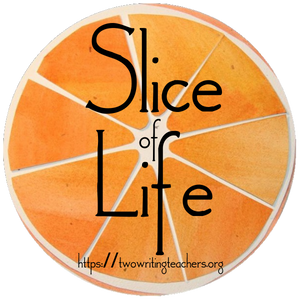This time of year is a frenzied leap from task to task, without the joy or benefit of reflection. So, for today’s “From the Archive” post, I thought I’d slow myself down long enough to explore ways to savor and enjoy these last days with my students. Enjoy!
Tag: education
Reclaiming Joy in Writing: An Update
In the spring of 2022, I started a writing initiative in my district. With a cohort of dedicated teachers, we worked to instill joy, foster independence, and create writing community. Where are we now?
Day 18 of the March SOLSC #SOL24
Write, share, give. And if you're up for a push, give yourself a challenge!
Day 17 of the March SOLSC #SOL24
It's lucky day 17 of the 17th challenge! Write, share, give, play.
Day 16 of the March SOLSC #SOL24
Write, share, give. And if you're stuck thinking of a Slice...make THAT your Slice!
Day 14 of the March SOLSC #SOL24
Write, share, give, and most of all...engage! Let the comment section be a place for community and friendship.
Crowdsourcing: Straight from the Classroom
I’ve used crowdsourcing in writing instruction here and there, but this was the first project I designed and taught using the strategy as a foundation for our work. The verdict? Crowdsourcing improves writing and engages students. In this post, I’ll share our process, and I hope others will find ideas and inspiration.
“Is This Good?” Building Self-Reliance in Student Writers
Picture a writing workshop. Students hum along on various pieces. Inevitably, a student approaches to ask: “Is this right?” “Is this good?” My experience and wisdom matter as a teacher. My support and guidance are critical. Still, I’d hope that students’ sense of pride and accomplishment wouldn’t depend on what I think of their work. I’ve discovered some conversational tools and classroom strategies that help me foster students’ sense of confidence and trust in themselves. I’m sharing them with you here.
My Favorite Writing Hack: Less is More
As a teacher of gifted children, I often find myself seeking strategies for students who already excel in writing. What can I offer that would teach them to strengthen their craft in ways they might not consider? Some of my students are exceptionally talented; I could easily take notes and learn from THEIR craft. What could I possibly add to their skill set? One answer to that question lay within my own writing journey...
Overview of the 11th Annual Classroom Slice of Life Story Challenge
It’s the middle of January. Where I live, that means blustery weather, dreary forecasts, and ALL the snow gear. It’s also a good time to think ahead to spring, which promises warmer temperatures, more sunshine, and – of course! – all the stories our students will share in the 11th Annual Classroom SOLSC! In this post, I’ll answer some frequently-asked questions about the Classroom Slice of Life Story Challenge.
When The “Help Desk” Fails: Rethinking Support for Writers
The Setup: Help Desk, Open for Business It started out like any other writing workshop time. Kids were settling into their work spots, some grabbing keyboards, others tapping away on their iPad screens. There was a certain level of productive noise as students figured out what projects they wanted to work on and how, and… Continue reading When The “Help Desk” Fails: Rethinking Support for Writers
It’s Tuesday! Time for the Slice of Life with #TWTBlog!
Here we are, once again, at one of my favorite times of the week: the Tuesday Slice of Life post. Write, comment with your blog link, and share the joy by commenting on at least three others' posts. Happy writing! Words have the power to really help us take in the world around us, understand… Continue reading It’s Tuesday! Time for the Slice of Life with #TWTBlog!










